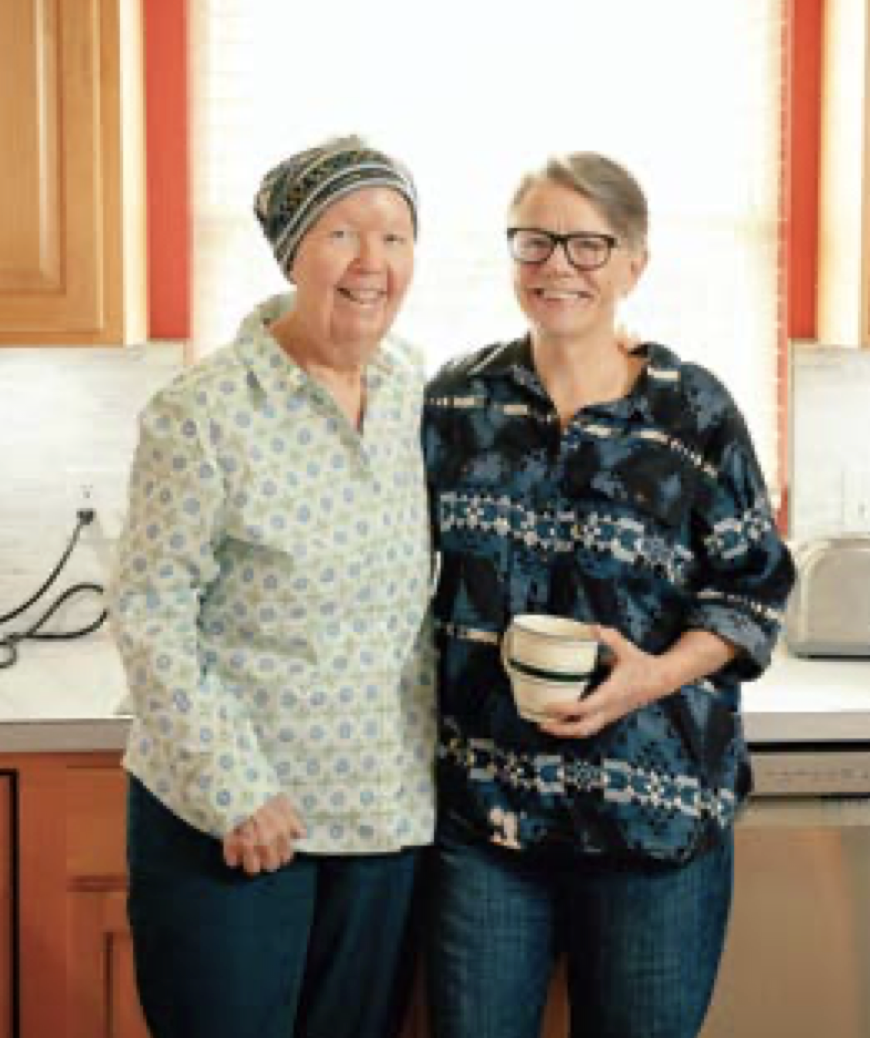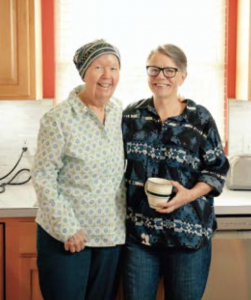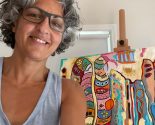
Former Between The Lines publishers reflect on cancer journey, retirement
by Ellen Shanna Knoppow
(The following piece appeared in the January 11, 2024, edition of Between The Lines, based in Ann Arbor, Mich., and is reprinted below with permission.)
Ringing the bell after her final chemotherapy infusion was a long- anticipated moment for Susan Horowitz, one that signaled the end of 19 weeks of grueling treatments. While Horowitz stood with health center staff and loved ones, her wife, Jan Stevenson, was on hand to capture the hard-fought accomplishment on camera.

“It was great to have people who had kind of been close to me during the recovery phase,” Horowitz said. “I mean, ‘recovery’ is a strange word. There wasn’t a moment when I recovered, but ringing the bell was like marking a moment in time when the chemo was done.”
The video received an “overwhelming and heartwarming” response online, Stevenson said. “This has been terrifying for me. The prospect of Susan having cancer and getting to the point where you can ring the bell was a real milestone.”
Two months later, Between The Lines sat down with the couple to hear their reflections on Horowitz’s journey from diagnosis through remission. They also let us in on life nearly four years after retiring from producing Between The Lines, Michigan’s premier queer print publication and its affiliated website PrideSource.com, which they ran from 1995 until 2020.
Although Horowitz and Stevenson are no strangers to the disease today, ovarian cancer was the last thing on their minds when Horowitz was suffering from a lingering case of COVID she got in the spring of 2022 that left her debilitated.
“I was totally asymptomatic,” said Horowitz, in reference to the unexpected cancer diagnosis. “And in the process of elimination, of trying to figure out what was happening to me with [COVID], they did a full body scan and found the tumor that two different doctors thought was likely to be benign.”
After the first surgery, the test results that came back from the Mayo Clinic indicated cancer.
At this time, there is no known reliable screening for ovarian cancer. It’s usually found at a later stage when there is less opportunity for life-saving measures. Horowitz, whose disease was found accidentally and at an early stage, said that, in an odd way, it was serendipitous COVID led her there, just as the remnants of the virus persist to this day.
“As I was going through those eight or nine months of not being able to really walk, it was really challenging,” Horowitz said. “I couldn’t walk right; I couldn’t talk very well; terrible headaches — all sorts of experiences with the COVID stuff. But once I got the cancer diagnosis in late March, we went into hyperspeed to find a surgeon.”
Horowitz and Stevenson landed at the Henry Ford Health Center where Horowitz was in surgery three weeks later. She said they had a remarkable experience with an excellent team.
“When I heard I had ovarian cancer, I thought, ‘Well, I’ll be dead in six months,’” Horowitz recalled. “And that diagnosis is almost going to be a year in March.”
To complete 19 weeks of chemotherapy, Horowitz endured a new infusion every three weeks. She reported being immobilized for the first week, while weeks two and three were slightly more tolerable. “I’m an adventurer,” Horowitz said wryly. “So I got to try every kind of possible side symptom of chemo that they offered.”
Stevenson stayed by Horowitz’s side for her near-daily appointments, including 34 trips to the infusion center. Horowitz said she couldn’t ask for a better caregiver.
“I could not imagine going through what I went through without her there,” Horowitz said. “I marvel at what she did — she did everything that I couldn’t do. My sense of independence was completely compromised.”
Stevenson was the cheerleader, too, even though she was terrified of the diagnosis as much as anyone. The fact that their friends stepped up made a huge difference as well.
Horowitz was still experiencing significant fatigue at the time of this interview, but Stevenson remarked on her progress.
“I feel like I’m starting to get my girlfriend back,” Stevenson said. “She can talk and walk and argue with me and yell at me like she always used to and all that stuff.”
“Yell about things,” Horowitz responded. “Not at Jan. Well, I mean, sometimes. Maybe sometimes.”
Two weeks after completing chemo at the end of September, Horowitz’s cancer was officially in remission. “I think I have more faith and more hope than I did at the beginning of this,” Horowitz said, reflecting on what she’s been through. “I’m more in the day each day, and I’m more appreciative of what I have.”
Even though she struggles with certain physical actions, most of the time it doesn’t define her. And while Horowitz calls herself impatient by nature, she notices that’s less the case today.
Stevenson has noticed changes in herself, too. Much of it has to do with the two of them getting older. “We’ve been sort of going through a process of, I call it, clearing the decks,” Stevenson said “Susan’s 70. I’m going to be pretty soon.” They’re simplifying their lives and focusing on things they like to do and people that are important to them. But it was Horowitz’s diagnosis that accelerated the process.
Horowitz had various support along the way, and she encourages anyone in a similar situation to take advantage of that. For her, that support included palliative care for pain management and mental health services, “because it is a unique chance to review life when you’re facing its possible end in the immediate future,” she said.
For Thanksgiving, Stevenson and Horowitz were joined by “a posse” of eight friends who needed a place to enjoy the holiday, a tradition that spans two decades. Neither has a large family.
“Cancer is a beast,” Horowitz said. “It’s also a great teacher. I think what I learned during that whole period was how important people are, to be surrounded by people who care about you and love you and who know what they’re doing. Those were the professional people, the nurses and the doctors. I just got so lucky with the team that I got to take care of me.”
Stevenson and Horowitz plan to take a road-trip this spring. For now, Horowitz must be careful not to get sick, so she’s wary of large crowds, though they have been out with friends for meals. She’s eager to get back to the theater and music venues, gardening and creating art.
“Honestly,” Horowitz said, “in July of 2021, I had back surgery. In the following spring, I got this COVID illness that lasted eight or nine months for 2022. And then in 2023, I got cancer. So we joke that now all I need to deal with is — what — acne, maybe?”
Given Horowitz’s physical challenges and the fact that they had a solid transition plan for the paper in place, retiring in 2020 after 25 years of running Between The Lines made sense.
“The transition happened during the height of COVID before the vaccine,” Horowitz said. “So everybody tried to respect one another in the process and did, I think, quite well. And I love that.”
“It’s a more rare product each year that goes by,” she continued. “There are papers across the country like Between The Lines that are closing.”
While they were publishing Between The Lines, the couple began running Happy Hounds Dog Day Care & Lodging in 2012 and
inherited the business from Stevenson’s sister in 2016. It’s notable for being a cage-free facility. Currently, Stevenson and Horowitz have two cats at home.
“My life is all about dogs and animals now,” said Stevenson, who has been volunteering twice weekly at Maybury Farm for the past two years. “I put hay in and take shit out. That’s what I do. I love it.” She was also an elf for the farm’s Santa event. “I always joke that I’m really barely housebroken and I’m outside as much as I possibly can be. I feel great.”
Still active politically, Stevenson is a poll worker and is involved in some campaigns. “We’re really interested to see [Congresswoman] Elissa Slotkin get elected [this] year,” she said.
It was their activism that informed the mission of the newspaper from the beginning. Horowitz pointed out that the mere existence of a queer newspaper like Between The Lines is inherently political and that while there is plenty of focus on matters of politics and policy these days, times have changed for the LGBTQ community. She says that Between The Lines, in its current form, reflects that evolution.
“I think it’s great,” Horowitz said. “I think the team’s really seemed to respond to what’s needed in the current climate.”
“One of the things that comes across my mind right now is how grateful I am that projects that both of us had been involved with for a long time are continuing to this day and are more needed than ever,” she added. “I’m grateful that Between The Lines is ongoing and that Affirmations that Stevenson was responsible for founding is ongoing. That is not something to take for granted. It’s because the community stepped up at critical times to keep things going over the course of its life.”
SPECIAL REPORT
Volume 26
Issue 1








